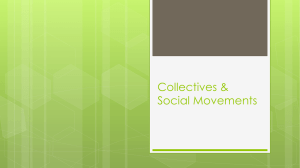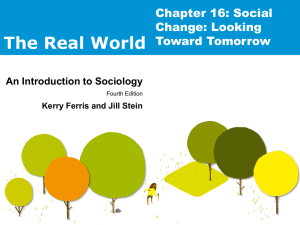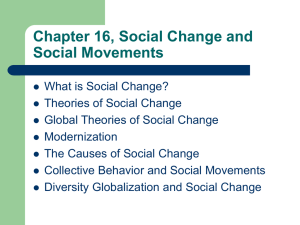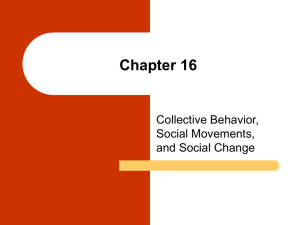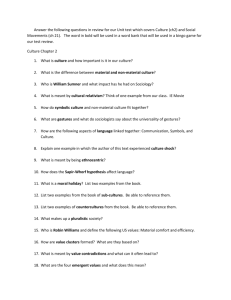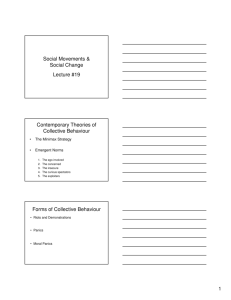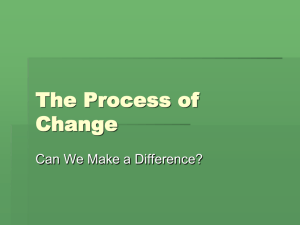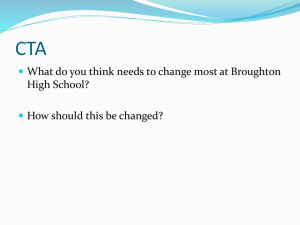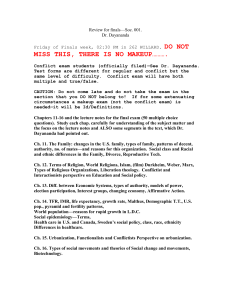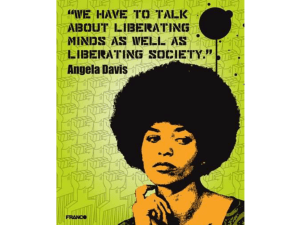Social Culture and Change
advertisement
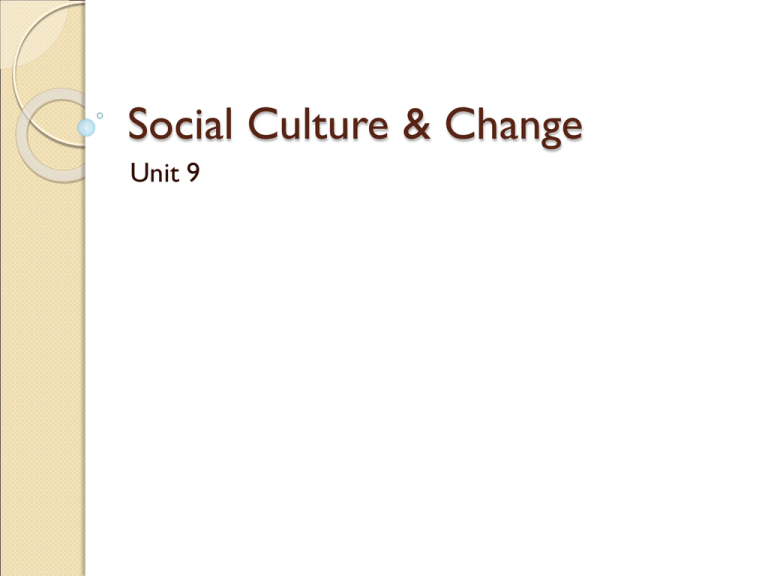
Social Culture & Change Unit 9 Sources of Social Change Environment ◦ Natural Disasters Population ◦ Birth rates ◦ Death rates ◦ Subcultures Sources of Social Change Technology ◦ ◦ ◦ ◦ Technological Determinism Automation Cultural lag Cultural Innovation Discovery Invention Diffusion Sources of Social Change Modernization ◦ ◦ ◦ ◦ Industrialization Urbanization Bureaucratization Convergence Theory Sources of Social Change Human Interactions ◦ Human action ◦ Collective behavior Environmental Factors Lack of Norms Relative Deprivation Breakdown of Social Control ◦ Social movement Sources of Social Change Global Development ◦ Developed countries = rich ◦ Undeveloped countries = poor Theories of Social Change Sociocultural Evolution Theory ◦ Mutilinear ◦ Simple to Complex Cyclical Theory ◦ Spengler: Society as an organism ◦ Toynbee: Society as a response to a challenge ◦ Sorokin: Sensate (gratification) and Ideational (faith) societies Theories of Social Change Functionalist ◦ Emile Durkheim ◦ Talcott Parsons Equilibrium Theory Conflict ◦ Karl Marx Interactionist ◦ Erving Goffman Dramaturgical World System Model World System Colonial System Imperialism Neocolonialism Multinational Corporations Social Change Revolution Collective Behavior ◦ Neil Smelser’s 6 Conditions Triggering Collective Behavior Structural Conductiveness Structural Strain Generalized Belief Precipitating Factors Mobilization of Participants toward Action Social Control Group Behavior Crowds ◦ ◦ ◦ ◦ ◦ Casual Crowd Conventional Crowd Expressive Crowd Solidaristic Crowd Active Crowd Mob Riot Group Behavior Gustave le Bon ◦ Contagion Theory Invincibility Suggestibility Lewis Killian ◦ Emergent-Norm Theory Mass Behavior Diffuse Crowds Mass Behavior ◦ ◦ ◦ ◦ ◦ ◦ Panic Mass Hysteria Disaster Behavior Fashion Fads Crazes Collective Communication Mass Media Technological Development ◦ Cell phone ◦ Email ◦ Txtng ur bff Negative Communication ◦ Rumor ◦ Gossip Collective Communication Neutral Communication ◦ ◦ ◦ ◦ Public Communication Opinion Leaders Propaganda Urban Legends Social Movements 4 Primary Social Movements ◦ ◦ ◦ ◦ Reform Movements Revolutionary Movements Resistance (Regressive) Movements Expressive (Utopian) Movements Social Movements The 4 Stage Life Course ◦ Preliminary Stage ◦ Popular Stage (Legitimization) ◦ Formal Organizational Stage (Bureaucratization) ◦ Institutional Stage Terrorism Terrorism ◦ State Terrorism ◦ Revolutionary Terrorism Theories of Social Movement Psychological Theories ◦ Social movements as deviance Strain Theories ◦ Deprivation Resource Mobilization Theories ◦ John McCarthy & Mayer Zald Population Counts Population Census Vital Statistics ◦ Population Projections ◦ Population Forecasts Population Composition ◦ ◦ ◦ ◦ Gender Ratio Racial Ratio Educational Ratio SES Ratio Population Growth 3 Factors to Population Growth ◦ Fertility (birth) Rates ◦ Mortality (death) Rates Age-specific death rates Neonatal & infant mortality rates ◦ Migration (attrition) Rates International Internal Immigration Emmigration Population Growth Life Span Life Expectancy Population Growth Demographic Transition Theory ◦ High Birth/High Death ◦ High Birth/Low Death ◦ Low Birth/Low Death Zero Population Growth Population Control Family Planning Antinatalism Economic Incentives Economic Improvements Urbanization Urbanization Metropolis ◦ City ◦ Suburb ◦ Rural Megalopolis Edge Cities Gentrification into low SES areas Urbanization Herbert Gains: 5 Major Groups in Cities ◦ ◦ ◦ ◦ ◦ Cosmopolites Unmarried & Childless Ethnic Villagers The Deprived The Trapped Urban Ecology Urban Ecology ◦ Ecological Segregation ◦ Invasion & Succession Ernest Burgess ◦ Concentric Zone Model Social Area Analysis Urban Theory Ferdinand Tonnies ◦ Gemeinschaft ◦ Gesellischaft Louis Wirth ◦ 3 Characteristics of Cities: Size, Population Density, and Social Diversity’ Herbert Gans ◦ Suburban culture a product of status & class Social Conflict War vs Peace Arms Race Nuclear War War on Terror Social Conflict Nuclear War ◦ 4 Principle (Immediate) Effects Electromagnetic Pulse Explosive Blast (pressure jump) Excessive Heat Direct Radiation ◦ Long-Term Effects Fallout Early Fallout Delayed Fallout
